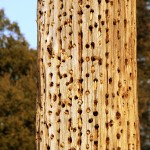Anachronism is a fancy word used to describe something that doesn’t belong in the time period in which you’re seeing it. A cell phone in a cowboy movie is an anachronism.
Some things that are with us at the moment seem like anachronisms because they look like they’re from another era. And you get the feeling that they’re not going to be around much longer.
Two examples: Telephone poles and newspapers.
Start with telephone poles: Look at them today when you’re driving. They belong in a movie filmed in the 1930s. They stand tilted and weathered, dead bodies of pines hauled from forests years ago. Yet they’re here. But for how long? Who’s going to miss them? Not drivers who wrap cars around them. Not linemen who climb them in a storm. Not anyone who likes a natural landscape.
But the Acorn Woodpecker’s going to miss them.

“Where do I go now?”
This Western bird with the clown face has a fondness for telephone poles. The poles are easy to find and drill into. Acorn Woodpeckers put holes all over the poles, and stash acorns and other nuts in them. You can see these holes as you drive in the west.

“A place for your nuts.”
When the poles go away, will the Acorn Woodpecker do the same? Will the wireless age create a woodpecker-less age?
Probably not, unless there are other problems facing the birds. Extinctions do happen. But as long as nothing else comes along to threaten them, these birds will live just fine without telephone poles. Sure, maybe they’ll spend some nervous days circling the gaps at the side of the road, wondering, “Where do I go now?”
But they’ll discover an alternative. Necessity finds a place.
There’s another anachronism we see every day. And it’s not going to fare much better than telephone poles as modernization keeps vaporizing things that used to be part of everyday life. It’s the newspaper, sad to say. At first, newspapers don’t seem to have much in common with telephone poles, except for a similar old-fashioned image. They too, look pretty natural in an old 1930s movie.
But now the web, with all its convenient access points, is the undeniable information carrier of choice. Consider where you’re reading this. Newspapers, like telephone poles, will fade away. Coincidentally, they’re also made by cutting down trees. (And they deal in lineage.) Their demise isn’t going to affect a woodpecker. But it will affect some people we know.

“Destined to fade away, sad to say.”
It’ll hit journalists in city rooms, clacking on keyboards. And it’ll hit ad people in martini bars, the cool taste-makers who made good money from ad lineage on newsprint. Like Acorn Woodpeckers, these guys will probably circle the gap where the thing that defined their territory used to be. They, too, will wonder, “where do I go now?”
But like the birds, they’ll survive. Their new work places might not look like city rooms or hi-rise ad agencies. Instead, they could look like a techie’s basement, a seat on an el train where you can open a laptop as you ride. Or a wi-fi cafe. Necessity finds a place.
